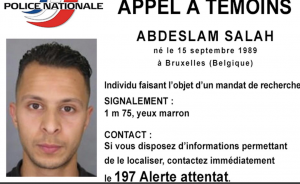Two people have been named officially as being involved in Friday’s terror attacks, while three other names have emerged in news reports.
French authorities have said seven attackers died while carrying out Friday night’s terror attacks, while one other believed to be “directly involved†in the bloodshed is on the run.
Belgian authorities have arrested seven other men in connection with the attacks. Only two have been officially named – one of the dead attackers, and the wanted man – but details have emerged about others suspected of involvement.
Among them are three brothers: one dead, one arrested and one on the run.
The Bataclan attackers
1. Omar Ismaïl Mostefai was the first attacker named by French authorities. He was a 29-yearold of Algerian heritage and grew up in Courcouronnes, south of Paris. He had a criminal record for petty offences. He was identified by prints taken from a severed finger found in the Bataclan concert hall, where he detonated his explosives belt.
French intelligence took note of Mostafei when he began spending time at a mosque with radical links in 2010, but they lost track of him in 2013, possibly because he travelled to Syria, the Washington Post reports.
French citizen Mostefai, is said to have a young daughter – believed to be around five years old – who former neighbours accused him of ‘abandoning’. One said when they knew him he appeared a ‘charming, a great guy’.
The local paper, Le Journal du Centre, reports that Mostefai attended a mosque in Lucé, a town that borders Chartres, and may have followed a radical Belgium-based Islamist who visited the mosque.
The Stade de France attackers
2. Another attacker who lived in Belgium was named by the Washington Post as Bilal Hadfi. He is thought to have fought for Islamic State in Syria, the paper said, but did not give his nationality.
3. A Syrian passport for a 25-year-old called Ahmed Almohamed was found near the Stade de France after the bombing. It was registered by a refugee who landed on a Greek island, Leros, on 7 October. The Serbian newspaper Blic reports that he crossed into the country on 7 October, having arrived four days earlier in Leros. The paper also reported that French security officials had asked their Serbian counterparts for help as the man had been registered in the southern Serbian town of Presevo.
A Greek newspaper, Protothema, said he was travelling with a second man, Mohammed Almuhamed, and published pictures purporting to show their travel documents. As ever, such details are hard to verify. It cannot be ruled out that the men were travelling under false documents – the Guardian has previously reported on the burgeoning trade in fake and stolen passports.
Suspect on the run
4. Salah Abdeslam. Police have put out a wanted poster for the 26-year-old. Salah is thought to have rented the black Volkswagen Polo used by the group that attacked the Bataclan concert hall, the Associated Press reported. He was born and lived in Belgium, although French police have described him as a French national. In the hours after the attacks, French police stopped Abdeslam and two other men close to the border with Belgium, but allowed them to go on their way because their names were not at that stage on any wanted list.
Boulevard Voltaire attacker 5. Ibrahim Abdeslam, the brother of on-the-run attacker Salah, was identified by prosecutors as the man who rented a Seat vehicle used in the attacks. He carried out the suicide attack at the Comptoir Voltaire cafe. Ibrahim, 31, was a French national based in Belgium.
Others
There are no details as yet on other dead attackers. A third Abdeslam brother, who has not been named, is believed to have been among seven people arrested on Saturday in the Molenbeek-Saint-Jean district of Brussels, suspected of being connected to the attacks. He is said to be protesting his innocence and his lawyers are attempting to get him released from police custody.
Several people were also detained in anti-terrorist raids in Toulouse, Grenoble, Jeumont and Bobigny, overnight on Sunday, but it is unclear whether any of these are directly connected to the Paris attacks. The Toulouse arrests are not said to be directly linked, but were carried out under the national state of emergency declared by president François Hollande after the Friday night attacks

